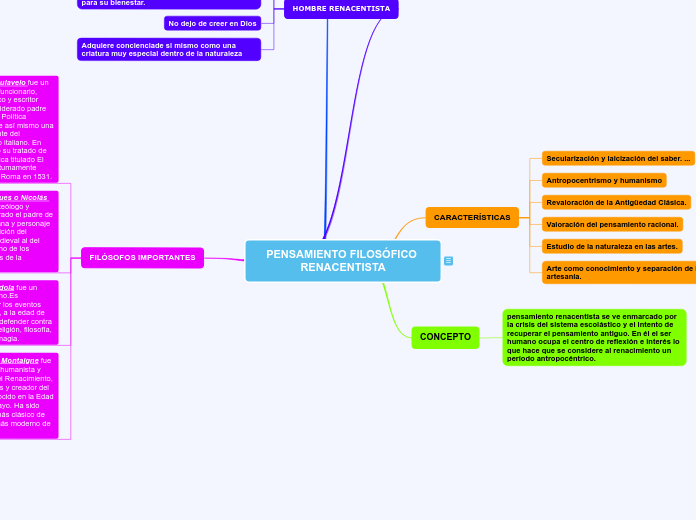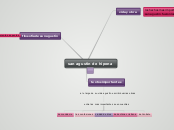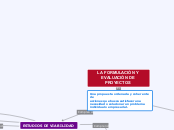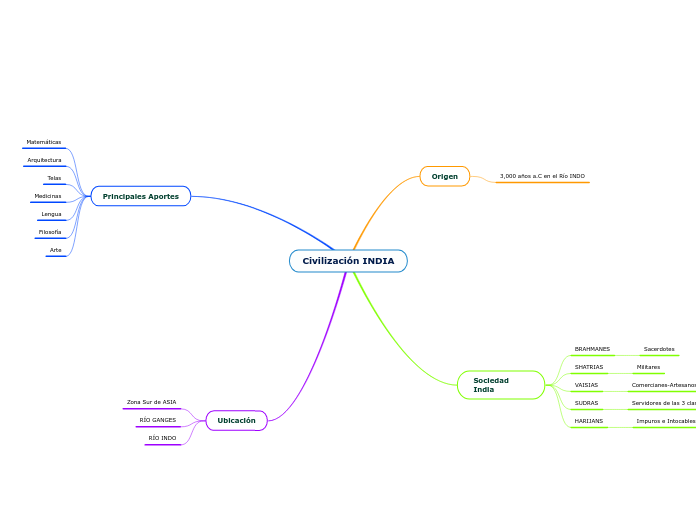PENSAMIENTO FILOSÓFICO RENACENTISTA
cdfcvdf
In linguistics, syntax is the set of rules, principles, and processes that govern the structure of sentences in a given language, usually including word order.
FILÓSOFOS IMPORTANTES
A compound sentence is a sentence that has at least two independent clauses joined by a comma, semicolon or conjunction. An independent clause is a clause that has a subject and verb and forms a complete thought.
Michel Eyquem de Montaigne fue un filósofo, escritor, humanista y moralista francés del Renacimiento, autor de los Ensayos y creador del género literario conocido en la Edad Moderna como ensayo. Ha sido calificado como el más clásico de los modernos y el más moderno de los clásicos.
Giovanni Pico della Mirandola fue un humanista y pensador italiano.Es especialmente conocido por los eventos acaecidos en 1486, cuando, a la edad de veintitrés años, se propuso defender contra todo opositor 900 tesis de religión, filosofía, filosofía de la naturaleza y magia.
Nicolaus von Kues o Nicolás de Cusa fue un teólogo y filósofo, considerado el padre de la filosofía alemana y personaje clave en la transición del pensamiento medieval al del Renacimiento, uno de los primeros filósofos de la modernidad.
Nicolás Maquiavelo fue un diplomático, funcionario, filósofo político y escritor italiano, considerado padre de la Ciencia Política moderna. Fue así mismo una figura relevante del Renacimiento italiano. En 1513 escribió su tratado de doctrina política titulado El príncipe, póstumamente publicado en Roma en 1531.
HOMBRE RENACENTISTA
A complex sentence is a sentence that contains an independent clause and one or more dependent clauses.
An independent clause can stand alone as a sentence, but a dependent clause even though it has a subject and a verb cannot stand alone.
Adquiere concienciade si mismo como una criatura muy especial dentro de la naturaleza
An adverbial clause is a group of two or more words that function as an adverb in a sentence.
No dejo de creer en Dios
An appositive clause follows another noun or noun phrase in apposition to it; that is, it provides information that further identifies or defines it.
Tambien se abrio al mundo moderno y asi exploto muchos avances y estos le servirian para su bienestar.
The subject clause is a dependent clause that acts as a subject.
El hombre renacentista se abrió mas al arte
A predicative clause may be introduced by conjunctions - that, whether, whether... or, as, as if, as though, because, lest, the way - or connectives.
The latter may be conjunctive pronouns - who, whoever, what, whatever, which - or conjunctive adverbs - where, wherever, when, whenever, how, why.
DOCTRINA PREDOMINANTE
Antropocentrismo:en el plano de la epistemología, sitúa al ser humano como medida y centro de todas las cosas, y en el de la ética defiende que los intereses de los seres humanos son aquellos que deben recibir atención moral por encima de cualquier otra cosa.
CONCEPTO
pensamiento renacentista se ve enmarcado por la crisis del sistema escolástico y el intento de recuperar el pensamiento antiguo. En él el ser humano ocupa el centro de reflexión e interés lo que hace que se considere al renacimiento un período antropocéntrico.
See the example below and try to create your own simple sentences.
Tim drives.
CARACTERÍSTICAS
Arte como conocimiento y separación de la artesanía.
An adverbial is an individual word (that is, an adverb), a phrase, or a clause that can modify a verb, an adjective, or a complete sentence.
Estudio de la naturaleza en las artes.
The attribute is defined as a quality or characteristic of a person, place or thing.
Valoración del pensamiento racional.
The predicative is defined as an adjective or noun forming or contained in the predicate.
Its main trait is that it serves to express a property that is assigned to a 'subject'.
For e.g.: The dog is old.
Revaloración de la Antigüedad Clásica.
Traditional grammar defines the object in a sentence as the entity that is acted upon by the subject.
Antropocentrismo y humanismo
The predicate of a sentence is the part that modifies the subject in some way. Because the subject is the person, place, or thing that a sentence is about, the predicate must contain a verb explaining what the subject does and can also include a modifier.
Secularización y laicización del saber. ...
The subject of a sentence is the person, place, thing, or idea that is doing or being something. You can find the subject of a sentence if you can find the verb.
Ask the question, 'Who or what 'verbs' or 'verbed'?' and the answer to that question is the subject.









